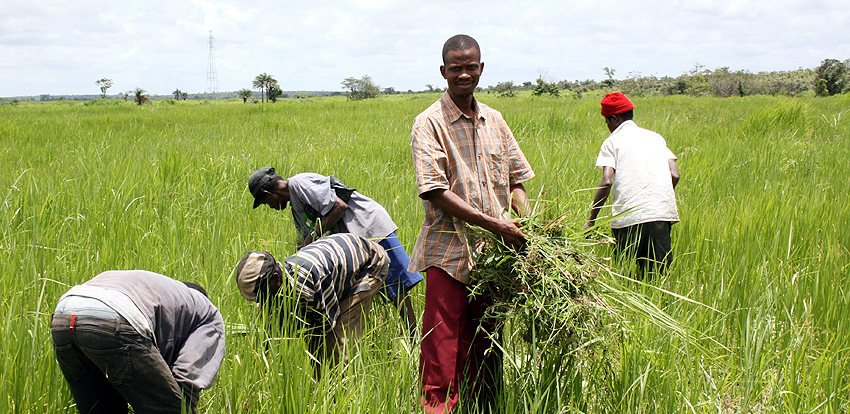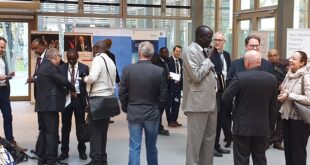Dr Akinwumi Adesina, President of the African Development Bank (AfDB), is at the centre of a brewing storm.
Adesina, a former Nigerian agriculture minister, is due for re-election for a second term of 5 years at the helm of Africa’s leading development finance institution.
The AfDB’s mission is to fight poverty and improve living conditions on the continent through promoting the investment of public and private capital in projects and programs that are likely to contribute to the economic and social development of the region.
While all African member countries of the Abidjan, Cote d’Ivoire-based bank have expressed their support for the ambition of the agricultural economist, he however has a formidable opponent, the United States.
The US is a non-African member of the bank and a major shareholder at that. The top 10 shareholders of the AfDB are Nigeria (8.20%), USA (6.60%), Egypt (5.60%), Japan (5.50%), South Africa (5.10%), Algeria (4.20%), Germany (4.20%), Canada (3.90%), France (3.80%) and Côte d’Ivoire (3.80%). The voting power on the bank’s Board is split according to the size of each member’s share, currently 60%-40% between African and non-African member countries.
The administration of President Donald Trump is against the re-election of Dr Adesina and it is seeking to scuttle his ambition by all means.
America is accusing Adesina of malpractices in the management of the bank.
Some officials at the bank had accused Dr Adesina of lack of respect of internal rules and regulations in recruitment, citing numerous cases of nepotism and favouritism. The main plank of the accusations is that AfDB has hired too many Nigerians into the bank’s top management.
Adesina has denied the accusations, terming them “spurious and unfounded allegations”.

The man behind the group making the allegations is the American representative at the bank as executive director, Stephen Dowd.
The AfDB’s Ethics Committee, made up of executive directors representing shareholder nations, deliberated over every single one of the allegations over a three-month span and has cleared Adesina on all the charges.
Analysts say America’s intention was that even if one of the allegations stuck, Adesina would have to be removed as President of the AfDB and made ineligible for re-election in August 2020. This attempt seems to have failed given the verdict of the probe panel.
However, the US is not relenting in its opposition to Adesina’s re-election. The Trump administration has asked for an external body to probe the allegations anew.
In a recent letter dated 22 May and addressed to Niale Kaba, chairwoman of the bank’s board of governors, the US Treasury Secretary, Steven Mnuchin, rejected the plans of the African bank’s board to end Adesina’s investigation and called for an independent probe into the allegations against him. However, there’s no provision for that in the bank’s governance rules.
This new development has led observers of the drama to begin to look closely at what might be behind the Americans’ opposition to Adesina’s continued leadership at the AfDB.
Some facts have now emerged that makes the motive behind the Americans’ attitude to Adesina clearer.
In February, the President of the World Bank, David Malpass, criticised the AfDB and similar regional development banks, such as the Asian Development Bank, for excessive lending, accusing them of contributing to emerging nations’ debt problems.
Speaking at a World Bank IMF debt forum in Washington on 10 February, Malpass, who is an American, said the AfDB was “pushing large amounts of money into Nigeria, South Africa, and others without the strongest program to sustain it and push it forward.”
The AfDB dismissed Malpass’ accusation as “inaccurate and not fact based. It impugns the integrity of the African Development Bank, undermines our governance systems, and incorrectly insinuates that we operate under different standards from the World Bank.”
The AfDB added that it relies on the IMF and World Bank debt sustainability analyses in designing its lending to African countries.
It has now been revealed that Dowdy, a personal friend of the World Bank chief, has also been internally criticising the lending policy of the AfDB.

Some analysts say the problem the US has with Dr Adesina is that he’s been employing the principles of development economics to run the AfDB and not according to the classic Bretton Woods practices of the World Bank and IMF.
In his keynote speech during the 8th African Leadership Persons of the Year in February 2020 in Johannesburg, Dr Adesina, explaining his work at the AfDB, said: “I focus on solutions, not problems. My principle for development is also simple: I simply list down the things I feel most ashamed of, and then I do the opposite. It’s how I came up with my idea for the African Development Bank’s High 5 Strategy to light up and power Africa, to feed Africa, to industrialize Africa, to integrate Africa, and to improve the quality of life of the people of Africa. Five simple, strategic, and highly focused objectives.”
Under Adesina leadership, AfDB’s lending has been driven by this “High 5 Strategy”, especially focusing on agriculture, energy and road infrastructure.
The African bank since Adesina assumed its leadership on 1 September 2015 has financed major infrastructure projects across the continent. These include the Ethiopia-Djibouti Power Interconnection Project and the Ethiopia-Kenya Transmission Highway Project, which is East Africa’s first high voltage direct current power line and expected to boost the exchange of electricity between the two countries.
The AfDB has also supported the first inter-regional 400 KV power inter-connector between Zambia, Tanzania and Kenya linking East African Community and Southern African Development Community (SADC) countries.
Other important energy infrastructure projects financed by the AfDB include the Kariba North and Ithezi-Thezi Power Hydro Generation Projects in Zambia-Zimbabwe, which provided power to the SADC region through the Southern Africa Power Pool.
The story is not different in other regions of the continent.

In the area of transport infrastructure, the AfDB has also supported the construction and improvements of multinational road corridors to facilitate a safer and efficient movement of people and goods across borders and landlocked countries to seaports, therefore facilitating regional integration and Intra- African trade as well as with global markets.
Dr Akinwumi Adesina focuses on infrastructure and energy as he correctly understands that a main challenge to development in Africa is that Western-controlled international lenders deliberately do not help fundamentally tackle the underperformance of African economies.
This is why despite hundreds of billions of loans and aid granted to the continent since independence, African economies have not developed strong capacity for sustainable growth and development.
Adesina is not a board room banker but an agricultural economist who has been actively and practically involved in development issues in Africa for more than three decades. He was Nigeria’s Minister of Agriculture and Rural Development from 2010-2015, where he made tremendous impact.
Before his ministerial tenure in Nigeria, he was Vice President of Policy and Partnerships for the Alliance for a Green Revolution in Africa. He had also served as a senior economist at the West African Rice Development Association in Bouaké, Cote d’Ivoire before which he had worked at the Rockefeller Foundation as an associate director for food security.
Dr Adesina’s records at the AfDB have been impressive. Under his leadership, the bank has maintained its AAA rating by all the four major global rating agencies, four years in a row – a reflection of the AfDB’s sound financial and risk management, excellent liquidity and strong shareholder support, experts say.
In 2018, Adesina helped create the AfDB-sponsored Africa Investment Forum which in 2018 and 2019 attracted more than $80 billion in infrastructure investment interests into the continent. The US opposed the creation of the Forum as it did not deem it necessary and ostensibly outside the remit of the bank.
In 2019 Adesina also successfully led the AfDB’s shareholder capital increase from $93 billion to $208 billion, again, in spite of strong US opposition.
The Americans have also not been happy with Adesina for not being critical of China’s investment activities in Africa. “Do not be overly concerned about China’s presence in Africa economically. Be more concerned about America’s absence,” he’s quoted to have once told a US audience.

Political economists say the battle between the US and Adesina is mainly a contest for the supremacy over development financing in Africa. The Americans fear the growth of AfDB’s capital base and its lending focus endanger the control they have always enjoyed through the World Bank on the continent.
Adesina has been honoured for his work. In 2010, United Nations Secretary General Ban Ki-moon appointed him as one of 17 global leaders to spearhead the Millennium Development Goals and in 2017, he was awarded the World Food Prize, generally known as the “Nobel Prize for Agriculture”. Dr Adesina used the entire $250,000 Laureate award prize to establish a fund to support youth in agriculture.
The US by its opposition to Adesina’s re-election has exposed its lack of interest in the real economic development of Africa by insisting on a system of development financing that has failed the continent and its people for more than six decades.
The election for the president of the AfDB will take place in August. Analysts say Africa should not allow itself to be manipulated against its own interest. Not even the US veiled threat to pull out of the bank should sway Africans from sticking to a strategy that can help wean the continent off a dependency on foreign aid.
Dr Akinwumi Adesina should be allowed to continue his work at the AfDB.
Femi Awoniyi
 THE AFRICAN COURIER. Reporting Africa and its Diaspora! The African Courier is an international magazine published in Germany to report on Africa and the Diaspora African experience. The first issue of the bimonthly magazine appeared on the newsstands on 15 February 1998. The African Courier is a communication forum for European-African political, economic and cultural exchanges, and a voice for Africa in Europe.
THE AFRICAN COURIER. Reporting Africa and its Diaspora! The African Courier is an international magazine published in Germany to report on Africa and the Diaspora African experience. The first issue of the bimonthly magazine appeared on the newsstands on 15 February 1998. The African Courier is a communication forum for European-African political, economic and cultural exchanges, and a voice for Africa in Europe.





























